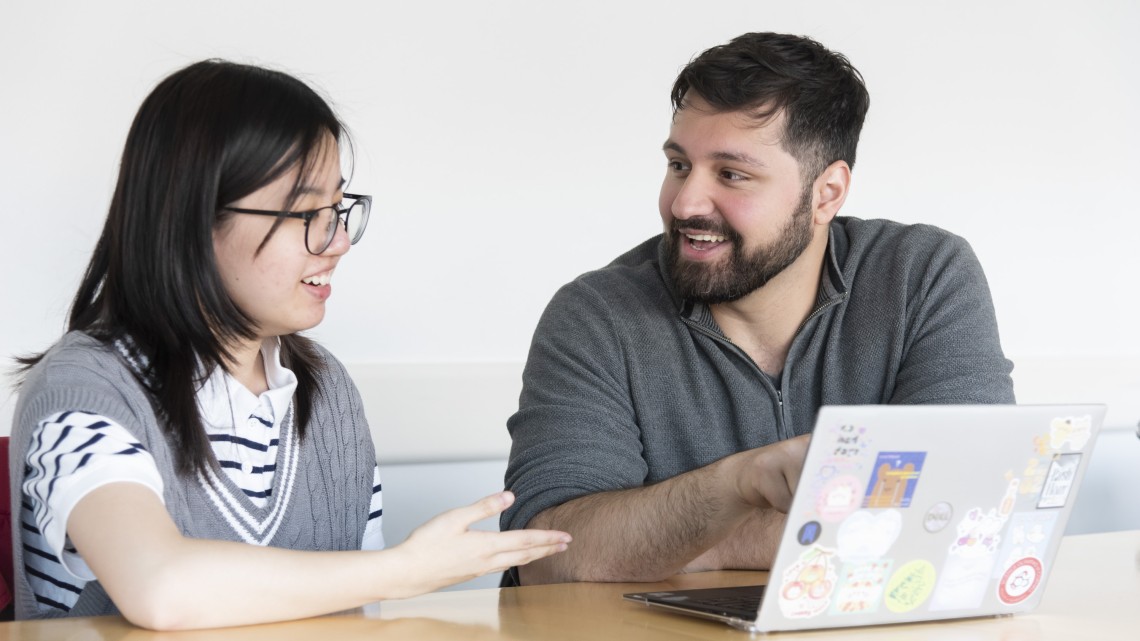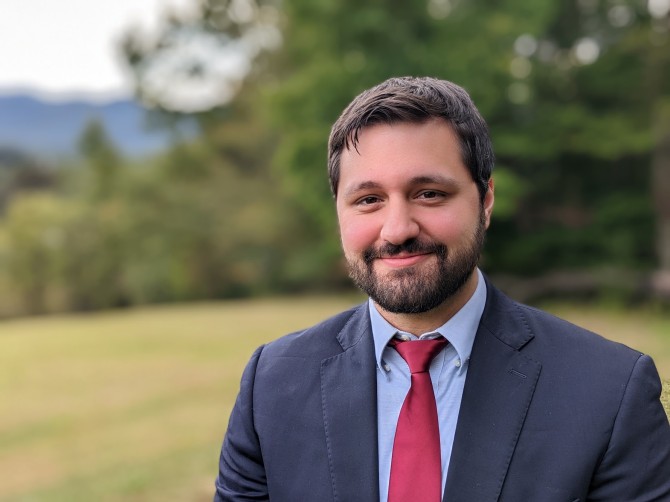
Farid Aboharb, right, and Diran Tan '25 study the effects of psychiatric drugs on gene expression as members of the Kwan Lab. Aboharb is the first student in a new M.D.-M.Eng. program that allows Weill Cornell Medicine students to earn a one-year professional Master of Engineering degree while in medical school.
News directly from Cornell's colleges and centers
Engineering, Weill Cornell Medicine pilot M.D.-M.Eng. degree
By Chris Dawson
As part of a new cross-college initiative designed to accelerate engineering innovations in medicine, Cornell Engineering is piloting an M.D.-M.Eng. program that allows medical students at Weill Cornell Medicine to earn a one-year professional Master of Engineering degree while they are in medical school.
“By giving medical doctors an understanding of engineering principles and innovative processes, we can graduate doctors that can also be partners in the development of improved devices and procedures,” said Newton de Faria, director of M.Eng. Programs at the Cornell’s Meinig School of Biomedical Engineering.
The first Cornell Engineering M.D.-M.Eng. student, Farid Aboharb believes the future of psychiatry will be characterized by greater precision, both in the tools used to image brains and the methods used to deliver therapies and treatments.
“Engineers bring a systematic approach to any problem. That engineering approach, I think, will be incredibly valuable in the field of psychiatry,” said Aboharb, who is a student in the Tri-Institutional M.D.-Ph.D. Program, a collaboration between Weill Cornell Medicine, the Sloan Kettering Institute, and The Rockefeller University.
While earning his Ph.D. in neuroscience at Rockefeller, Aboharb studied social cognition and was focused specifically on electrophysiology and taught himself how to program, how to 3-D print, and how to prototype devices for use in his research.
“After that experience with none of the formal engineering training, I knew there were a lot of holes in the way I was thinking about things,” Aboharb said. “I really valued those skills that I developed for myself, and I wanted to spend some additional time focusing on them in a structured way taught by experts.”
The M.Eng. in biomedical engineering is project-based. Students collaborate with other students, researchers and device makers on real-world challenges in the biomedical field. Knowing that Aboharb is earning an M.Eng. and M.D. degree at the same time, it should not be a surprise to learn that he is part of three M.Eng. projects rather than the typical one.
One project is focused on improving treatments for the premature rupture of the amniotic sac in pregnant women; another project aims to create a device to help in the treatment of craniosynostosis, the premature fusion of two or more bones of the skull of a growing baby; and the third project examines the effects of psychedelics and related compounds on brains in the lab of Alex Kwan, associate professor of biomedical engineering.
De Faria says that Aboharb has been an ideal pilot student for the M.D.-M.Eng. program.
“Farid brings so much knowledge and curiosity and a willingness to learn,” de Faria said, "and because of all the experience he already has as a medical student with a Ph.D., he has been like another teacher and mentor to some of his fellow M.Eng. students. Having him here has been great for everyone.”
Aboharb will finish his M.Eng. degree in May of 2023 and return to New York City, where he’ll complete his final year of medical school and apply for residency. When asked if the extra year of school it took to earn his M.Eng. has been worth it, there was no hesitation to his answer.
“Completely. I feel like as a physician you develop one perspective about diagnosing and treating disease, and as an engineer you learn a fully complementary perspective on technology and processes and improving both,” Aboharb said. “It’s such a valuable combination.”
There will be two M.D.-M.Eng. students in the next cohort at the Meinig School and de Faria is looking forward to growing the program beyond that in the years to come.
“This program is designed to be tuned and customized to what each of the medical students wants and needs to get out of it,” de Faria said. “It is a real win-win for everyone.”
Media Contact
Get Cornell news delivered right to your inbox.
Subscribe

